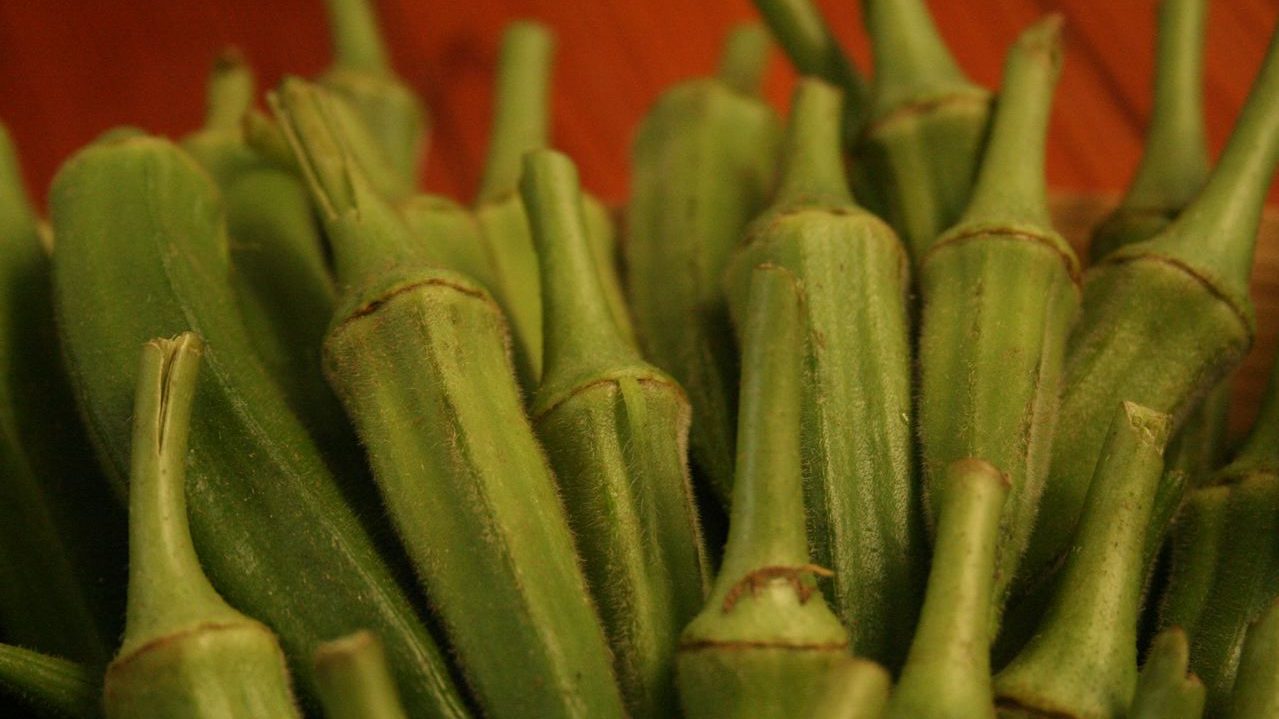Yemisi Aribisila, the cook and essayist, describes the art of chopping okra, a forceful and methodical exercise that “you can hear from three houses away.” In Nigeria the vegetable is known as okro, and she follows that usage as she explicates the process. “The okro fingers are cut into small pieces, then chopped, then jounce-chopped to within an inch of life. The seeds are pounded with the knife until the personality of the vegetable is extracted from every pristine seed to create green and white surrender.”
Okra is an emotional matter. It is a talisman vegetable of the global South (which includes the American South) and comes burdened with a host of assumptions and complexes that relate, at root, to disparaging the subaltern’s taste in the service of white supremacy and colonial domination. I’ve written on this elsewhere, and these battles are important to fight. But how refreshing it is to spend a few weeks away from the culture wars, in a society that eats okra without complex. Where the vegetable’s glorious consistency is called draw, not the ugly slur slime. Where, as Yemisi writes, “okro is much-loved but handled as perfunctorily and efficiently as an official file.”
Most okra treatments in Nigeria conform to the general West African approach: cut it small and make it the base of a thick soup, in which can be involved other vegetables, meats, fish, or other seafood; season according to regional or family custom; serve with a starch. The astute reader will recognize this methodology as being the exact same one that produces gumbo, in New Orleans or Charleston. Okra, the vegetable, is a core food of the African diaspora, but not an exclusive: it has equally rich histories in the eastern Mediterranean basin, and in South Asia. Okra soup, however, by any name (and by the way, the word in Francophone Africa for okra is gombo), is as Black Atlantic as it gets.
Somewhere along the way, in Nigeria, Seafood Okro became its own thing: a restaurant dish, the label differentiating it from any okro soup you might have at someone’s home, even if that one brimmed with seafood. It is, in that sense, a dish of privilege. Not the privilege, say, of sushi, which you can find of decent quality in Lagos, and for which you can expect to pay similar prices to New York or London, or the privilege of champagne; seafood okro is a national privilege, inaccessible to the poor but within middle-class reach, and thus aspirational but also grounded, even authentic. Unlike your regular soup, it invites careful consideration of its components and making—What mix of seafood has the cook chosen? What texture has the okra achieved, and how well does this marry with the other elements?—and encourages flourishes in presentation. Seafood okro is celebratory but in a gentle way, not at all ostentatious. It is an ambassadorial dish, like biryani; it would have been the perfect dish (way better than jollof rice, which is overrated) to welcome oyinbo people to the Nigerian palate, except most of those idiots don’t appreciate okra.
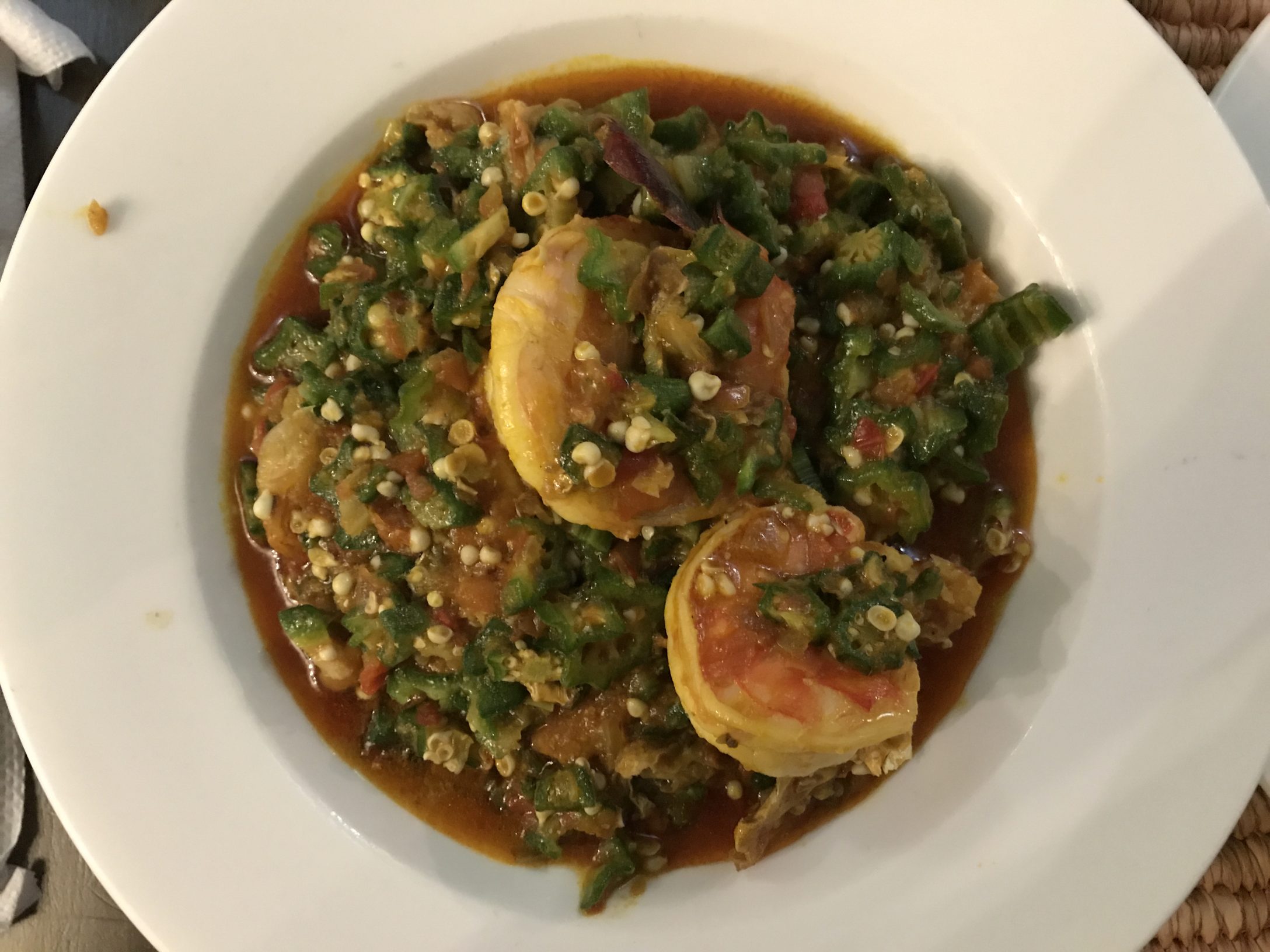
Yellow Chilli, Victoria Island, Lagos
Naira 3,800
When I see seafood okro on the menu, I try it. It doesn’t always hold up. The seafood okro from 100 Hours, the enjoyable all-night joint on Awolowo Road, has the right elements but no flavor integration; it’s a jumble, not a finished product. At Nok by Alara, the excellent upscale restaurant attached to the also-spectacular Alara boutique and concept store, the ingredients are impeccable—the fish is a standout, fleshy and fresh—but the dish lacks depth; it wants more time to integrate, and more seasoning. Yellow Chilli, which specializes in classic Nigerian dishes ever so slightly dressed up, remains a consensus champion, the Barcelona or Juventus of the genre; you might have a different favorite, but this one is always reliable. The restaurant has two branches, in Victoria Island and in Ikeja GRA on the mainland, and it’s the first place I’d take a friend from New Orleans, at once to anchor the connection and to launch our journey.
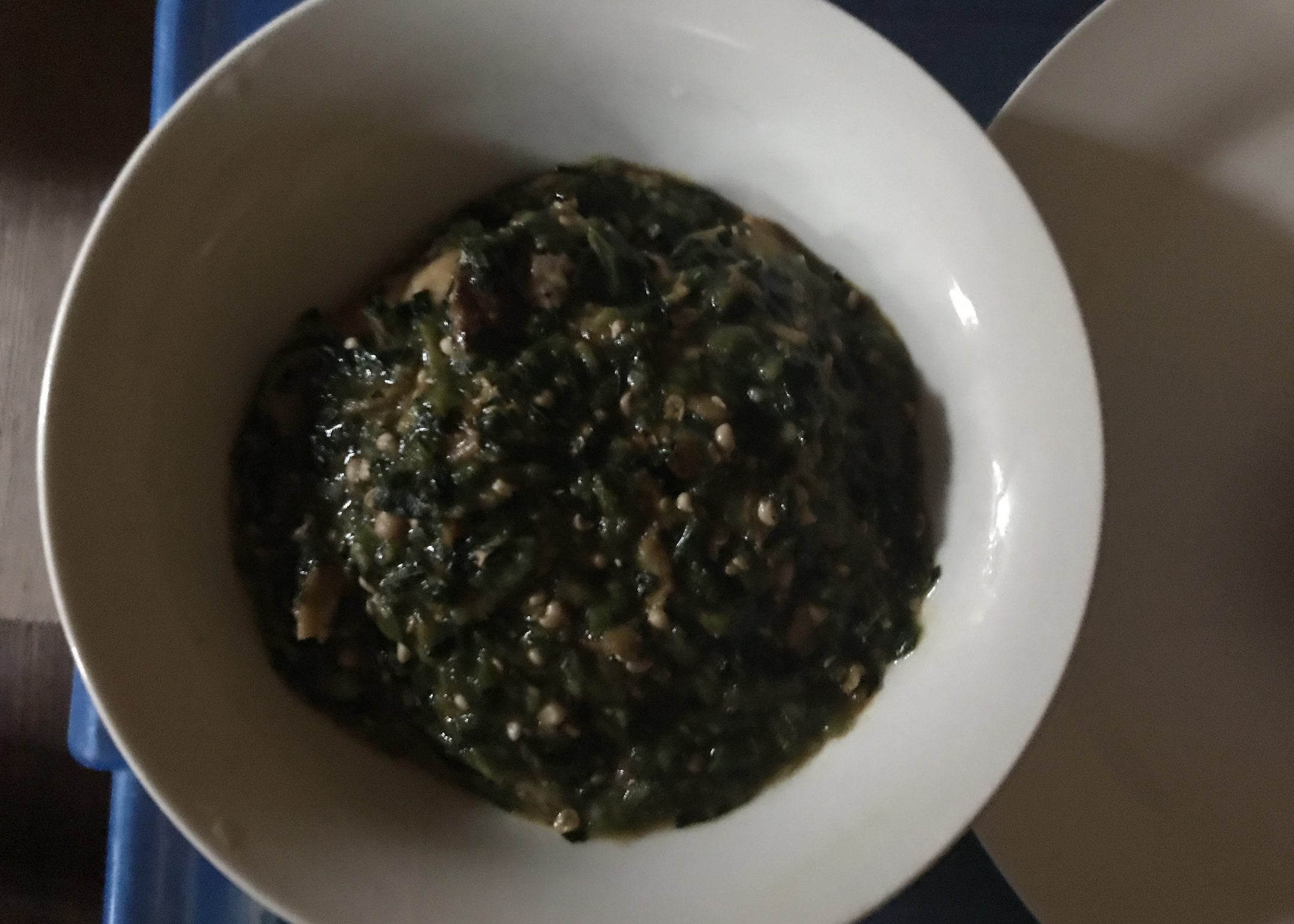
At home, Isolo, Lagos
Chief has six daughters. They are fierce, feminist, enterprising, fearless. There is one son, too, and a father, but they don’t get mentioned much; this is a cadre of powerful women, and many a would-be suitor has stepped up and found he just couldn’t hang. At first the daughters seemed to be having daughters themselves, but the law of averages has begun to catch up, and now Chief has an assortment of grandsons as well. Chief is even fiercer than her offspring. She arrived in Lagos from the east, after the Biafra War, and for many years she has run a buka—a streetside food and beer spot—in Isolo, which is one of those working-to-middle-class Lagos areas on the mainland that are perfectly nice, but where you would have zero reason to go unless you had friends there, and even then, you might not want to deal with the traffic. Chief lives in Isolo, and two of her daughters are nearby. It’s a largely Igbo area, with posters on the walls for Igbo traditional musicians or advising of funerals of people with Igbo names. It was a few years ago, on a visit back to her ancestral village in Abia State, that Chief was honored with her traditional chieftancy. The daughters enjoy the designation. “Chief, Siddhartha says hello,” one of them texts on the family WhatsApp group when we meet soon after my arrival in Lagos. The reply comes quickly: “Awww hello Siddhartha, when will you come to eat okro soup?”
This is an important pilgrimage, obviously, and so we plan for a Sunday, when traffic is lighter and there is time to really sit together and dig in. Nevertheless, I am late, having made the mistake of scheduling studio visits with artists beforehand. When I finally arrive, in a home dimmed by power outage (the standard Nigerian condition) and with the generator off to save fuel, I run the standard gantlet of loving reproach from my friends as their children swarm me. Chief, however, goes straight to the heart of things: Do I want a beer now or with my meal, and before the okro, do I want my pepper soup with fish or chicken? The pepper soup is one of the best I’ve had. Rather than blow my mouth out with heat, it has equilibrium, the chicken tender, the broth complex and therapeutic. I’m ready.
Chief’s okro is dark. Forest green, and a dark forest at that. I’m going to have to visit Igbo country, and then onward to Calabar, because southeastern Nigeria has the most complex cuisine, the greatest variety of soups, the strongest treatments of vegetables—not just okra, but all sorts of leafy greens, and egusi and ogbono seeds—and hyper-local specialties like achara soup, which comes from Umuahia and has a creamy consistency, a bit like coconut but more savory. Chief’s okro appears unadorned, brooding. The seeds glisten in the half-light. Dig in, and flecks of fish appear, along with the flesh of cockles, or periwinkle. This okro is an environment, a cosmos. The draw—the beautiful thickness—is optimally calibrated. It has an interiority. The spirits invite.
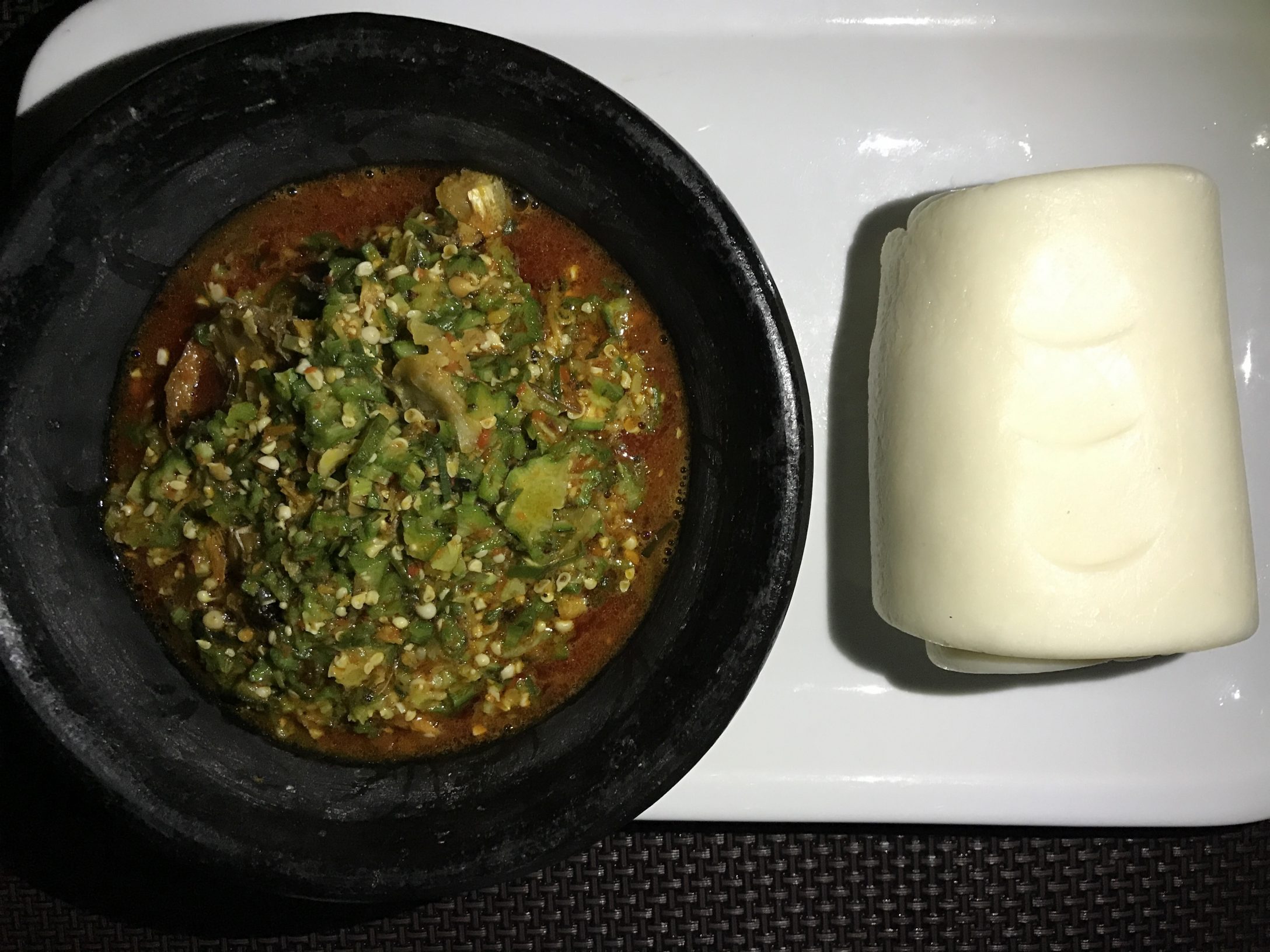
The Roots, Ikoyi, Lagos
Naira 1,400
I’m staying off Awolowo Road in Ikoyi. I have a small kitchen, and nearby are plenty of food options: assorted bakeries and chicken spots, the comfortable but overpriced Orchid Bistro, a Chinese restaurant that I keep meaning to try but never do. There’s also the Spar supermarket where I purchase my basics; it has a steam-table with prepared foods that are inexpensive and that I can take home and reheat. The okro seems to be finished each time I come around, but I try the other soups—ogbono, efo riro, and so forth. There’s always some other customer to comment on the oddity of a non-Nigerian—an oyinbo, at that—who seems to appreciate the local fare. This gets annoying, especially since I’m tired at the end of a long day of work, and not in the mood. One woman asks me if I’m buying the food for myself. I ask her if the food is not good; it is good, she concedes. So does she want me to not eat good food? Another time it’s Esther from the Falomo branch of Union Bank. She says I should come around and open an account. I explain I don’t live here; she says I should just stop by. I say maybe; she asks for my phone number. I decline. The cashier at check-out is more on my wavelength. “Good evening,” I greet him. “Good evening, sir! How was work today? May God bless our hustle!” God bless, indeed.
A couple of blocks away is the Roots, a restaurant with an enclosed garden where you can eat and drink, and stay for music—on one evening, we find ourselves in the middle of a pretty swinging hip-hop showcase. The food is solid too, and decently priced for the area. I come around one day with a friend and we order both okras on the menu: the seafood okro, and the plain one. The latter is both cheaper and the winner on taste. The okra, finely chopped, has an emerald aspect; the soup has the telltale rust tone that indicates infusion with red palm oil, which is not the best for your arteries but extremely tasty. On the side, the eba has come rolled like a crêpe, a common small flourish in presentation, instead of lumped in a ball. Slightly to the waiter’s concern, I have ordered the soup without a “protein”—that is, no added meat or fish. But the dish has stockfish, the dried fish that Nigerians love to incorporate in their soups (and which is usually imported from Norway, but that’s a story for another time), and this plus the palm oil delivers a smoky tone and deepens the okra’s binding effect in perfect alliance.
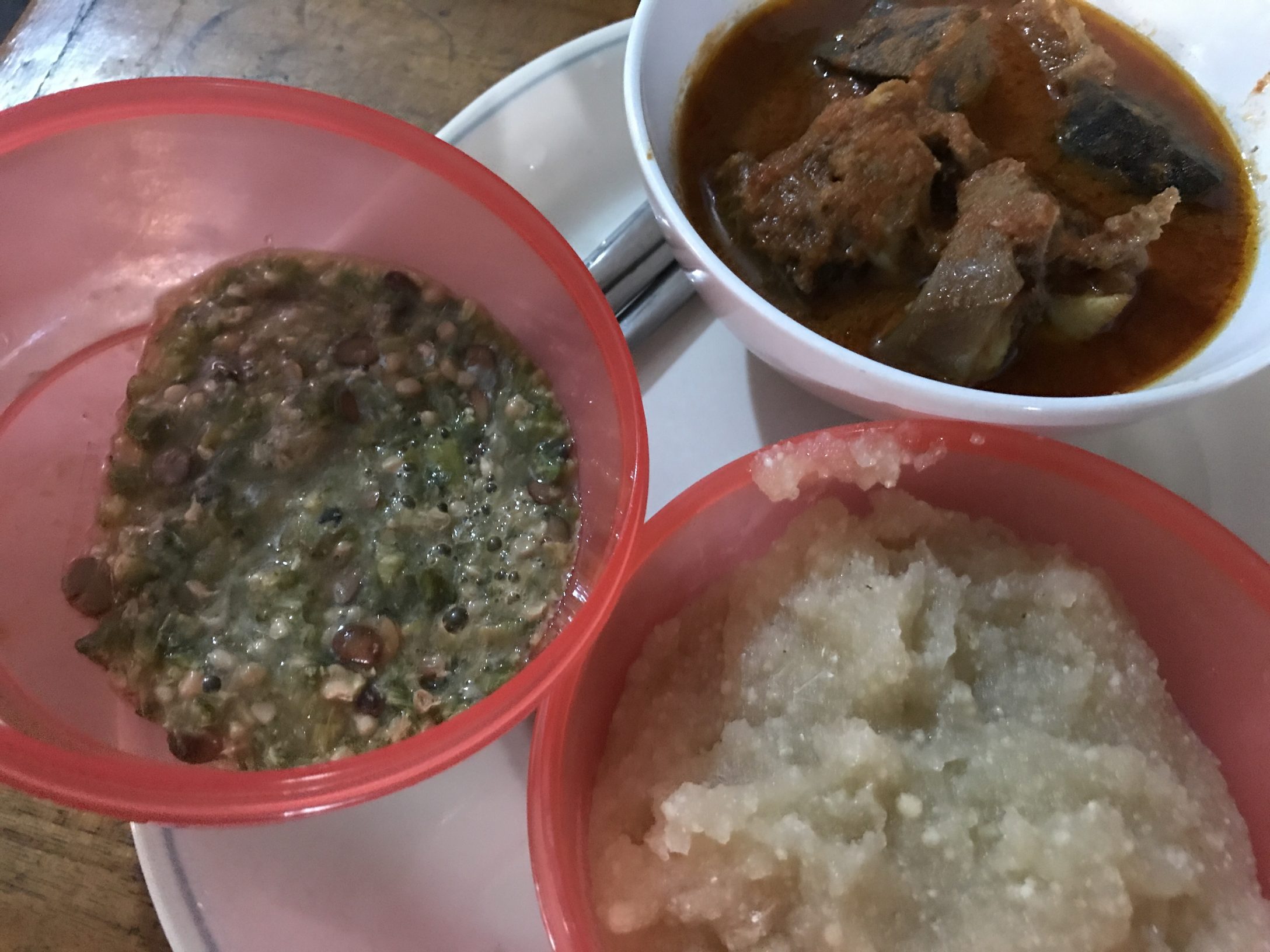
At home, Ojodu, Lagos
Technically, Mummy Bisi and Daddy Ayo don’t live in Lagos—the estate straddles the border between Lagos State and Ogun State, and their house lies in the latter, though the city doesn’t care. It has expanded across the state line and for kilometers along the ravine below their home, where builders continue to plant precarious new neighborhoods on the sharp incline. Mummy and Daddy were among the first to construct a home here, some thirty years ago, and the estate has grown around them, a nice middle-class settlement, large enough that taxi drivers know its name, with the usual trappings: a private school, some churches, fresh pavement with speed bumps on blocks where residents agreed to pool their money for improvements, ruts, and craters where they did not. The hum of generators; the security guards, requesting an exit slip signed by a resident before they will let out an unfamiliar car; the cluster of shop stalls, barbers, and other streetside businesses just beyond the gates. Every so often, Mummy tells me, Ogun State sends tax collectors around who attempt to collect payments from half the estate, which in return tells them to kindly piss off. (She puts it more politely.) Not that Lagos State does much more for the area, but still. Also, Lagos State has outlawed amplified nocturnal religious services, so that at least you get peace from that direction, whereas the vigils and pre-dawn casting and binding carry on from the Ogun State side.
I’ve stayed here before, and might have again, were it not for the distance from the city center and the excruciating traffic, and once we’ve exchanged greetings, I excuse myself to the kitchen so I can look out the back door into the ravine, a favorite view. It’s been mostly shut off since my last visit: a neighbor has built a home extension, and now when cooking or washing the dishes you can no longer look to the middle distance, with the never-finished concrete houses and the wild but thinning vegetation and the haze on the horizon. Indoors is unchanged, thankfully: the comfortable armchairs, the family photos, Africa Magic Yoruba on the television screen. I’ve arrived at lunchtime, though of course Mummy would have fed me at any hour. There’s always a big pot of red stew—the staple Yoruba concoction made of tomatoes and bell peppers—and yam or eba or plantain or chicken. Today there’s okro, too. Yoruba okro is a bit of an outlier in West Africa. You cook it plain, no palm oil, no meat, no prawns, no nothing; it arrives as a iridescent green thickness—very thick, it hangs from the spoon—and once at table, you combine it in your bowl with the omnipresent stew and whatever meat the latter contains. I suppose my problem isn’t with the okro itself. The treatment is very pure; it honors the vegetable. The stew, however, has a domineering bent. Red and thick and peppery, it tends to override all other flavors. Yoruba people love their stew, though. And this, in truth, is the way to enjoy it: at home, combined with okro, followed by dodo and chicken, washed down with a tall Star beer, served with a mother’s true love.

